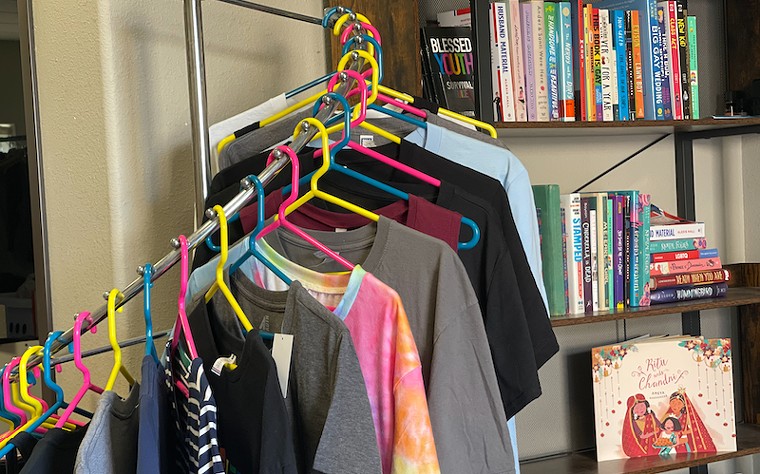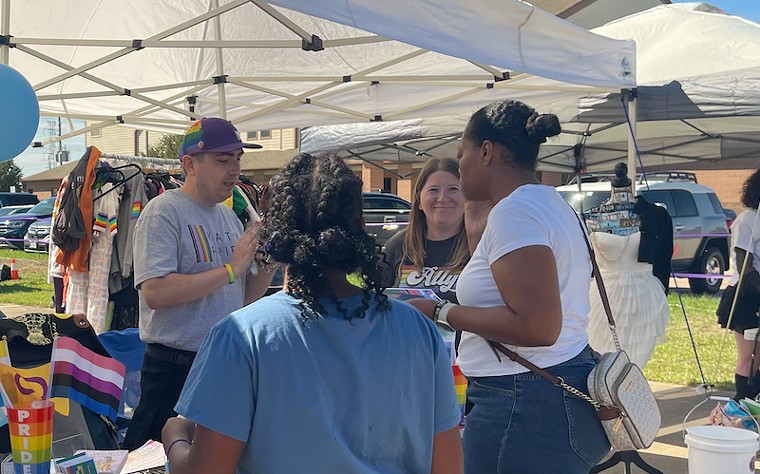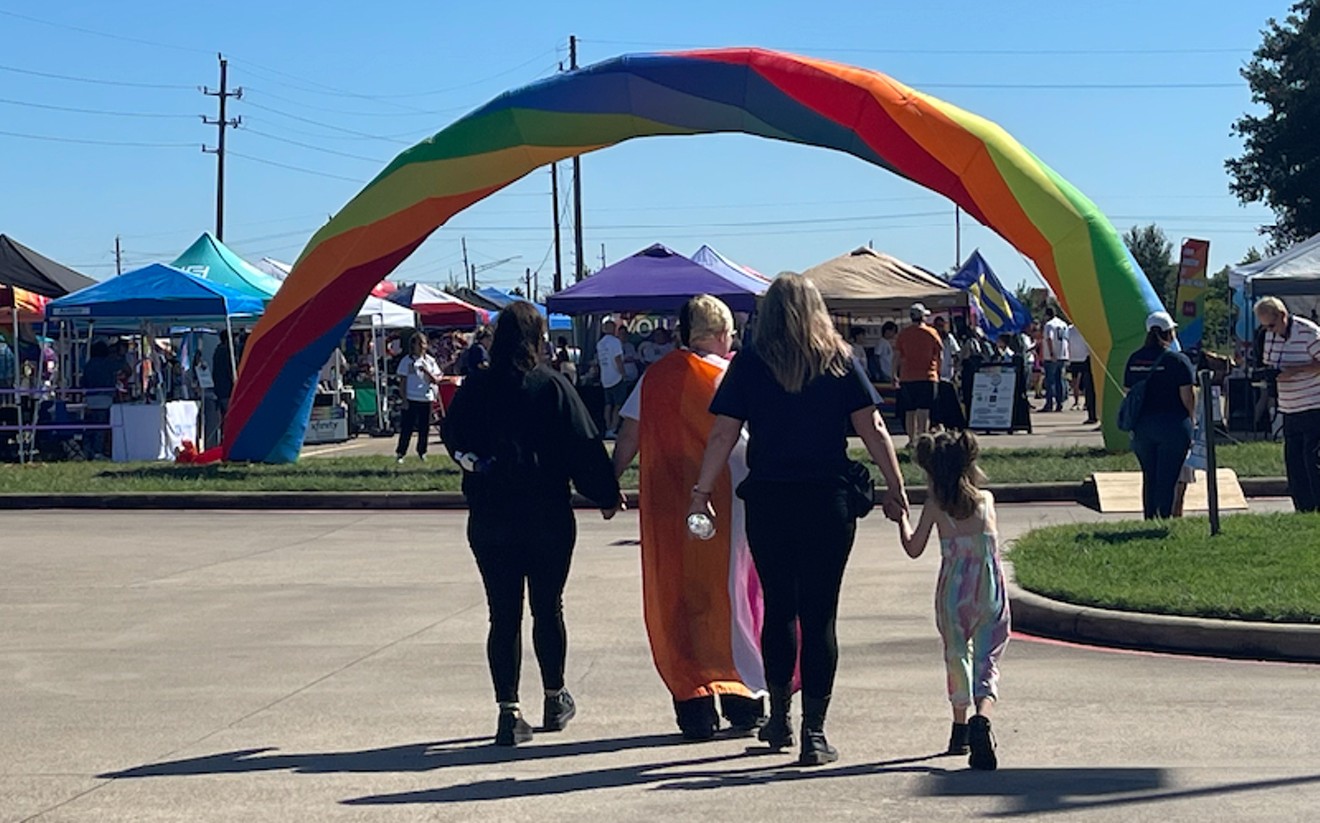All the while, Onambele, a now 19-year-old transgender male, navigated a change of his own.
“I would constantly feel too feminine, but at the same time, I was transitioning out of being only feminine,” he said. “It was really confusing for me, and I didn’t know what I wanted, and I didn’t know how to present myself in a way I fully liked.”
Onambele started his transition during his junior year at Cinco Ranch High School – known by Katy ISD students to be one of the more LGBTQ+-friendly schools in the district.
Despite his self-discovery difficulties, Onambele said he was lucky to be in a more accepting environment because he knew this wasn’t the reality for many transgender students.

Once surrounding himself with a tight-knit group of queer friends, James Onambele said he started feeling comfortable enough to experiment with his gender identity.
Photo by James's mother
Onambele, who graduated in May, is concerned that more transgender and other LGBTQ+ students will find themselves in similar situations since KISD implemented a new gender-related policy in late August.
This policy mandates restrictions on the instruction and discussion of “gender fluidity” in the classroom and other district-sponsored extracurriculars.
The measure also requires district staff to tell a student’s parents if that child asks to be referred to with preferred pronouns or a preferred name – which Onambele and others against the policy say is the most harmful part.
KISD is the most recent district in the Greater Houston region to implement this kind of measure, following suit of others statewide, such as Keller ISD, as increasing conservatism from school boards and district administrations seep into LGBTQ+ students’ daily lives.
“It (the policy) would’ve made me less open, which wouldn't have been great because being referred to as a girl was super uncomfortable for me,” Onambele said. “Not feeling like I could talk to anyone about that would’ve harmed my development and probably slowed me down more.”
“It seems like such a small difference, but in reality, it would’ve affected my life if I didn’t have those few teachers who were allowed to ask me, ‘What are your pronouns?’ ‘What is your name?’ without spreading my business,” he said.
Critics say they worry about the lasting effects the policy could have on LGBTQ+ students’ mental and physical well-being. Despite varied enforcement of the measure across the district, many queer students and their supporters say they are facing an upswing in discrimination since it first passed.
Reactions to KISD's No Talk Policy for LGBTQ+
When LGBTQ+ and allied students first caught wind of the new KISD policy, most were shocked.“I asked myself, ‘Is the district even allowed to do this?’” Joy Rogers said, a nonbinary KISD student at Cinco Ranch High School and resource officer for the school’s Gender and Sexuality Alliance.
Zeo McGehee, who is also a nonbinary KISD student at Tompkins High School and uses they/them pronouns, had a similar reaction. They said Tompkins is also known to be one of the district’s more accepting high schools.
“It almost seemed like nothing prompted it,” McGehee said. “I heard about it, and it just blew my mind that this was even happening to me, you know?”
Other students, such as Jarred Burton, McGehee’s classmate, were not as surprised.
“I’ve been following these things in other districts and states for a while,” he said. “It just kept getting closer and closer, so it felt inevitable. But that doesn’t mean it didn’t feel any less depressing.”
Burton was one of the roughly 90 people who signed up to speak against the policy at the late August board meeting. He said he got more emotional than he expected during his public remarks.
The following morning, Burton awoke to the news that the measure had passed on a 4 to 3 vote.
“I felt very numb the whole day. You pour your heart out, and you put all your effort into making sure something like this doesn’t happen, and it happens anyway,” he said. “It makes you feel powerless.”
According to Rogers, a precursor for this policy was the district’s removal of books that largely featured LGBTQ+ characters or content. Rogers kept track of this through a former fellow Cinco Ranch student and founder of the school's second GSA, Logan McLean.
McLean was among the main advocates to raise awareness of the district’s book banning and the gender-related measure once KISD’s board of trustees introduced it.
"These actions are really just creating a culture of fear in Katy ISD, and it's sad to see that because I was in the district for 13 years from Grades K through 12," she said. "I don't think it was always like this, I had some hope, that things were getting better and I'm not so sure now."
The district’s actions regarding book bans intensified when three new board members, Amy Thieme, Morgan Calhoun and Mary Ellen Cuzela, were elected as new board members in May. Each of these women ran campaigns largely promoting their intended efforts to remove books within district libraries that contained what they saw as sexually explicit content.
The district has since paused book purchases, kept books in storage and removed books from library shelves.
The board has also changed the formal book review process, ultimately allowing the trustees' full authority to remove a book from the shelves – if two of the seven board members agree – and vote to ban it entirely.
Despite the board’s crackdown, Rogers said many nonfiction titles still contain LGBTQ+ topics but are not banned.
However, most of these books are from before gay marriage was legalized, and despite coming across as educational, Rogers said they are outdated and challenge queer peoples’ rights.
Looking for Some Safe Havens
Given the recent actions by the board, LGBTQ+ students say they are searching for places where they will receive the support they are no longer getting – or were never fully receiving.Reverend Heather Tolleson, senior pastor at First Christian Church, and Amanda Rose, church board chair and president of the recently established Katy Pride, said they have been working to meet these needs since hearing about the policy.
“We are trying to intentionally fill in the gaps being created,” Tolleson said.
A staple for Katy’s queer community, First Christian Church, is not new to providing a home for what some may incorrectly think of as an LGBTQ+ community tucked away in the city’s suburban neighborhoods.
For several years, the church has amassed crowds at its drag queen events and seen countless visitors from nearby areas and out-of-state stop at its Transparent Closet – a no-cost gender-affirming clothing boutique, which opened in 2019.
The closet offers clothing, apparel, and accessories of any style, size, shape and color. Those shopping can also pick up binders, breast prostheses, makeup, shoes, and underwear if needed. Customers' ages vary; however, Rose said roughly 60 percent of shoppers are KISD students and from other nearby school districts.

In the same hallway as the Transparent Closet sits a "banned bookshelf" also started by the church.
Photo by Faith Bugenhagen
According to Tolleson, despite board trustees having said the policy’s intention is not to affect the existence of GSAs, the way the text is written leaves it open for interpretation. She says these groups could be at a greater risk of getting shut down by new board members in the coming years.
To provide an alternative place for GSAs to meet if needed, the church has offered their youth safe space, K Place, where young LGBTQ+ students and their allies have somewhere to hang out and talk. The church has hosted several movie nights and provides a queer community group run by two LGBTQ+ therapists.

Zeo McGehee and Joy Rogers with GSA officers at Tompkins and Cinco Ranch High School and other members of the Katy community who participated in Pride's Transparent Closet Fashion Show.
Photo by Faith Bugenhagen
Rose said the formation of Katy Pride was a long time coming. The nonprofit organization received its accreditation in June. Although it is separate from the church, Tolleson is a board member of Katy Pride alongside Kristina Shackelford and Alex (who asked to be referred to by only using their first name).
Rose said the turnout for the event “far exceeded their expectations,” they (Rose uses they/them pronouns) projected about 1,000 to 1,500 attendees and ended up with more than 2,000 visitors to the festival.
“I spoke with a mom sitting in the pumpkin patch who had planned to take her daughter to Houston Pride but got sick, so she came to ours instead,” Rose said. “It was truly touching because she told me, ‘I’ve never seen my daughter as happy as I’ve seen her today. She can’t believe so many people would support her.’”
“That’s just a glimpse. There's more to that, but just hearing that in my heart solidifies why we do what we do,” they said. “Because there’s plenty of those stories in the Katy community, we just don’t know all of them.”
Unlike one of the church's past drag queen bingo events, which brought over a hundred protesters, some of whom were armed, there were no incidents at the festival. Tolleson said this was a testament to what could change in only a year.
“We chose not to be intimidated. We continued to be vocal and showed that it wasn’t a one-time thing. Not only did we not cancel or back down, we showed we will continue to do this time and time again,” Tolleson said. “I honestly think the opposition to what we stand for just realized they’re never going to win. We silenced their voices in a one-year timeframe.”
The church and Katy Pride will be hosting more social events and the organization already confirmed the date for next year’s festival. However, in the wake of the policy passing, both plan to transition their focus on getting more information, education and resources to those needing it.
Tolleson added that their work with KISD students is far from over.
“As the trickle-down effects of what's happening continue to play out until we can create some movement and change, this will become increasingly more important and relevant,” Tolleson said.

The Rev. Heather Tolleson said being vocal in the community can be painful and scary, but days like the one at Katy Pride make it worth it.
Photo by Faith Bugenhagen
Initial Effects
So far, Burton said the responses to the policy and initial implementations have varied across district campuses. He said it’s been complicated to navigate because the wording in the measure is very vague, so it is difficult to know what is and is not allowed.According to Burton, it comes down to whether or not a school is more accepting. At Tompkins, he said, “It hasn’t been great, but it could be worse.”
Burton and McGehee have heard from students who have said some teachers feel emboldened to purposely “deadname” – refer to a transgender person by using their birth name and not the name they choose to go by as part of their gender transition – or address students using the wrong pronouns.
At one school, Burton said, a student showed up to class the day after the policy passed and was confronted by one of their teachers. The instructor pointed to the student’s deadname and said, “We’re going back to this now.”At this point, the student left the room and proceeded to drop out of the school later that same day.
McGehee said staff members have tried to find loopholes in the policy. One includes their GSA sponsor stepping out of the room when students discuss or refer to preferred pronouns during meetings.
This is done to prevent their sponsor from having to report these students, as the measure calls for staff to do.
“Many teachers have just said, ‘I’m not going to enforce this policy,’ which is very appreciated,” Burton said. “But I am afraid that something will come from it. The last thing I want to hear is my parents getting an email about some kid that took their own lives after being outed to their parents.”
Jen Escobar, a KISD parent, said, ironically, the board members have claimed the policy is out of respect to parents’ rights to choose and know what is best for their child.
Yet, the measure doesn’t support all district parents and guardians’ choices and leaves an unsafe environment for those who do have LGBTQ+ children who may feel like their children are in dangerous situations, they can’t ask questions about their child’s identities or don’t have peers to turn to for support.
Escobar’s oldest son, a 24-year-old transgender male, went to a different school district than his siblings. Throughout his four years there, he struggled amid pushback from teachers and administrators regarding his identity.
“I feel like there’s a line they (the board members) have drawn, and you’ve got to be on one side or the other. There’s no middle ground with any of it,” Escobar said. “It polarizes Katy, and it harms real people. It's going to affect real lives.”
Escobar and others against the policy said KISD board members are also overestimating families' willingness to accept their queer children once they come out to them.
"I don't think these policymakers think about that, but there are violent aggressive parents that do not care for their kids' well being. If they find out that their kid is trans, they will do anything to ruin that child's life," Onambele said. "And I've seen it happen."
What's Next?
Students’ support of their LGBTQ+ peers since the policy passed has also been a mixed bag.“I didn’t hear many comments from students about how much they loved the policy,” McGehee said. “I've heard so many people who I didn’t even think were very interested in queer rights or queer issues just talk about how messed up it is.”
According to McGehee, more students have shown solidarity at the school's GSA meetings since the implementation of the measure.
Rogers said this is not the case at Cinco Ranch, where fewer students have been in attendance.
“I feel like people don’t view GSA as much of a safe space," Rogers said. "Especially this year, our membership is significantly down from last year.”
Rogers said they are concerned about students' attitudes because they hear from more and more LGBTQ+ friends who are getting bullied or called names.
Bianca Perez, Cinco Ranch GSA’s president, said one of their group’s officers was carrying a mini pride flag to show their support of the organization’s cause, which prompted them to get harassed by two students who made derogatory comments toward the officer.
“I feel like over the years, I’ve seen a lot of people get more comfortable with the fact that people are gay or queer,” Perez said. “But the people who haven’t gotten used to that are more open and bolder about how unhappy they are with queer people existing now.”
Alex, a nonbinary KISD elementary school teacher who oversees volunteers at the Transparent Closet and did not want their last name used for this article, said the policy has also directly affected many queer teachers like them.

Alex said since the KISD policy passed the number of people wanting to help out at the closet or make donations to it has increased.
Photo by Faith Bugenhagen
Although Alex's school responded positively, some of the teachers Alex is friends with are not allowed to wear anything that is rainbow – a symbol of the LGBTQ+ community – to work.
Onambele, who is currently working through his gap year and plans to attend art school in New York next year, said he has always wanted to be a teacher but said if he taught in a district with this kind of policy – he wouldn’t know what to do.
“It’s taking away safe spaces from people, and it’s pressuring teachers who want to be a safe space to have to shut that down,” he said. “I think if I had to go through that, seeing my trans students struggle and I can’t help them because I’ll get fired if I say anything – that would kill me. It would kill my spirit.”
Onambele said he was lucky to have been at Cinco Ranch, where most of his peers and teachers, excluding the occasional homophobic student or instructor, were supportive during his transition.
According to Onambele, having most people around him not be outwardly bigoted to him or make him feel like an outsider helped him avoid thinking that being transgender was wrong.
“Many trans people are in their head, worrying about this stuff, and are mentally affected. It’s [transitioning] sensitive, and it shouldn’t be messed with,” Onambele said. “Because it’s you, you know?”
“These policymakers and us, the teachers, students and community members, don’t align. We’re not on the same page at all,” he said. “These board members are never thinking about the big picture, and then it’s up to the community to think about it and fight for our rights. That shouldn’t happen. They need to think about everyone and see everyone.”







